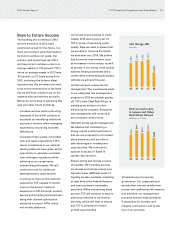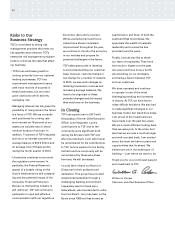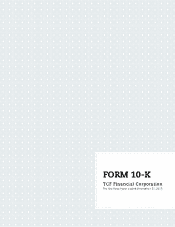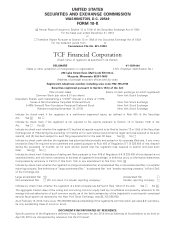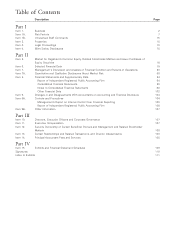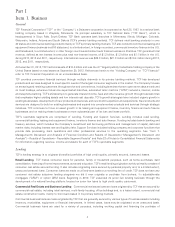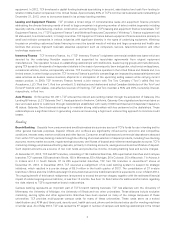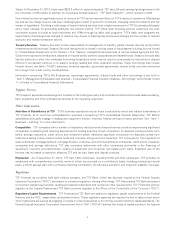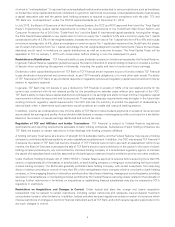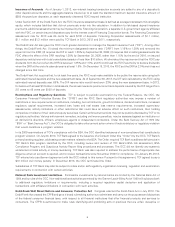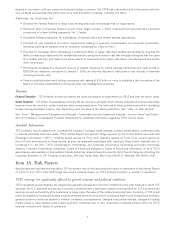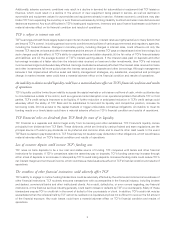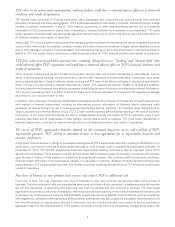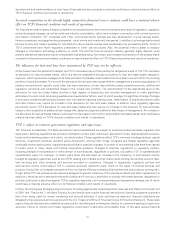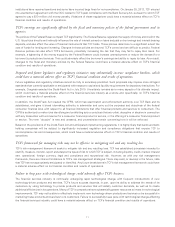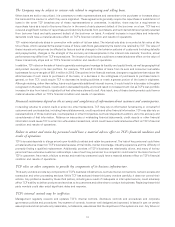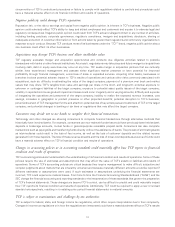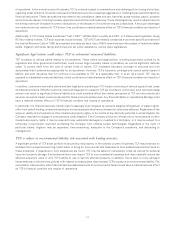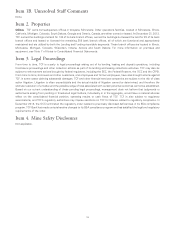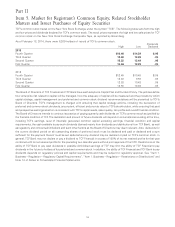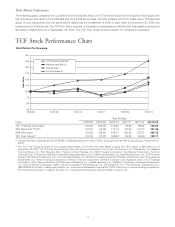TCF Bank 2013 Annual Report Download - page 23
Download and view the complete annual report
Please find page 23 of the 2013 TCF Bank annual report below. You can navigate through the pages in the report by either clicking on the pages listed below, or by using the keyword search tool below to find specific information within the annual report.abusive in connection with any consumer financial product or service. The CFPB has examination and enforcement authority
over all banks and savings institutions with more than $10 billion in assets, including TCF Bank.
Additionally, the Dodd-Frank Act:
• Directed the Federal Reserve to issue rules limiting debit-card interchange fees for larger banks;
• Removed, after a three-year phase-in period which began January 1, 2013, trust preferred securities as a permitted
component of a bank holding company’s Tier 1 Capital;
• Eliminated federal preemption for subsidiaries of national banks and federal savings associations;
• Provided for new disclosure and other requirements relating to executive compensation and corporate governance,
including requiring an advisory vote on executive compensation (‘‘Say on Pay’’);
• Provided for mortgage reform addressing a customer’s ability to repay, restricted variable-rate lending by requiring the
ability to repay to be determined for variable-rate loans by using the maximum rate that will apply during the first five years
of a variable rate loan, and made more loans subject to requirements for higher cost loans, new disclosures and certain
other restrictions;
• Permanently increased the maximum amount of deposit insurance for banks, savings institutions and credit unions to
$250,000 per depositor, retroactive to January 1, 2008; and allowed depository institutions to pay interest on business
checking accounts, and;
• Required publicly-traded bank holding companies with assets of $10 billion or more to establish a risk committee of the
Board of Directors responsible for enterprise-wide risk management practices.
Taxation
Federal Taxation TCF’s federal income tax returns are open and subject to examination for 2012 and later tax return years.
State Taxation TCF and/or its subsidiaries currently file tax returns in all states which impose corporate income and franchise
taxes and local tax returns in certain cities and other taxing jurisdictions. The methods of filing, and the methods for calculating
taxable and apportionable income, vary depending upon the laws of the taxing jurisdiction. See ‘‘Item 1A. Risk Factors’’.
See ‘‘Item 7. Management’s Discussion and Analysis – Consolidated Income Statement Analysis – Income Taxes’’ and Notes 1
and 12 of Notes to Consolidated Financial Statements for additional information regarding TCF’s income taxes.
Available Information
TCF’s website, http://ir.tcfbank.com, includes free access to Company news releases, investor presentations, conference calls
to discuss published financial results, TCF’s Annual Report and periodic filings required by the United States Securities and
Exchange Commission (‘‘SEC’’), including annual reports on Form 10-K, quarterly reports on Form 10-Q, current reports on
Form 8-K and amendments to those reports, as soon as reasonably practicable after electronic filing of such material with, or
furnishing it to, the SEC. TCF’s Compensation, Nominating, and Corporate Governance Committee and Audit Committee
charters, Corporate Governance Guidelines, Codes of Ethics and changes to Codes of Ethics and information on all of TCF’s
securities are also available on this website. Stockholders may request these documents in print free of charge by contacting the
Corporate Secretary at TCF Financial Corporation, 200 Lake Street East, Mail Code EX0-01-G, Wayzata, MN 55391-1693.
Item 1A. Risk Factors
Various risks and uncertainties may affect TCF’s business. Any of the risks described below or elsewhere in this Annual Report
on Form 10-K or TCF’s other SEC filings may have a material impact on TCF’s financial condition or results of operations.
TCF’s earnings are significantly affected by general economic and political conditions.
TCF’s operations and profitability are impacted by general business and economic conditions in the local markets in which TCF
operates, the U.S. generally and abroad. Economic conditions have a significant impact on the demand for TCF’s products and
services, as well as the ability of its customers to repay loans, the value of the collateral securing loans, the ability of TCF to sell
loans, the stability of its deposit funding sources and sales revenue at the end of contractual lease terms. A significant decline in
general economic conditions caused by inflation, recession, unemployment, changes in securities markets, changes in housing
market prices or other factors could impact economic conditions and, in turn, could have a material adverse effect on TCF’s
financial condition and results of operations.
7


